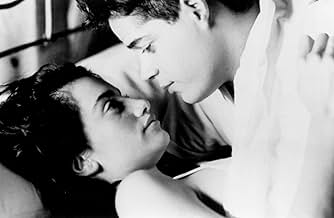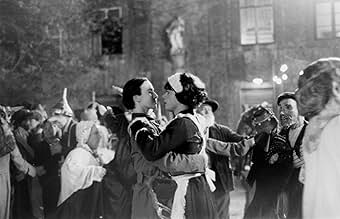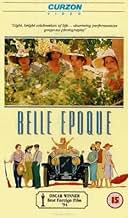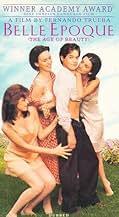IMDb RATING
7.1/10
12K
YOUR RATING
A 1931 Spanish military deserter finds himself on a lonely farm until the farmer's four daughters pay a visit and he falls for all of them.A 1931 Spanish military deserter finds himself on a lonely farm until the farmer's four daughters pay a visit and he falls for all of them.A 1931 Spanish military deserter finds himself on a lonely farm until the farmer's four daughters pay a visit and he falls for all of them.
- Won 1 Oscar
- 25 wins & 15 nominations total
Joan Potau
- Paco
- (as Juan Potau)
Featured reviews
Belle Epoque has many layers. At it's core is a romance which is surrounded and disguised by a classic sex farce that is itself enveloped by a philosophical tale all wrapped up in a bittersweet historical setting. Spain is, as throughout it's history, in a political struggle. In this case, a battle between the dying monarchy and the emergent republic which is,as these things go, a mild one leaving most Spaniards to enjoy their lives during this "Belle Epoque". Those familiar with it's history know that this is the short calm before the storm of the Spanish Civil War in which the Republic is replaced by the Fascist dictatorship of Franco through a bloody war. My favorite setpiece is the dance where Violeta wears Fernando's uniform and dresses him in a ball gown and wig; the rest must be seen to be believed! A lovely film! And why the devil isn't it on DVD!?
The plot, this is a movie about a straggler that is taken in by a local Spanish elder who happens to have 4 very beautiful and very single daughters. In the next hour, the straggler ends up having relations with all four daughters. The side story of the Spanish civil war and the relationship between the 4 sisters and their parents is simple background to the main plot of sexual desire and the tension that becomes to obvious to hide. A beautiful cast of people, the ending is somewhat sad, but true. A nice film, and surprisingly, no nudity? Still, it is a nice "sexy" film.
10Johnny B
Belle Epoque is one of those movies you don't see every weekend at the theatre. It is a film set in a certain age (in this case: Spain during the times of the civil war), where the age itself is not very important, but it effects the way the story evolves. The best thing of all in this film is the acting and the comedy. The farce is excellent - hardly ever seen a film with such intelligent humourism. The first time I saw the film was in Spanish and I laughed my guts out (even though I do not know Spanish a lot ). The story too is not too complicated and at the same time it is not at all banal. The highlight of the film, in my opinion, is when the wife of Manolo goes to visit him and starts singing an aria from some opera. Some of the comic highlights of this movie are when Rojio is asked to try her mother-in-law -to-be's wedding dress and when Juanito enters her bed. The best quote from the film is Clara's: "A Woman cannot stay without a man, especially at night." Anyway, just about everything about this movie is great. Well, in short, WATCH IT
Fernando Trueba's enchanting 'Belle Epoque' is a delightful little 'folktale' that is lyrical, sensual, hilarious, whimsical and human. Azcona's cleverly written screenplay is rich with wit, sarcasm and history. In addition to that the film also looks beautiful and authentic (compared to the overload of glossy look in a majority of films).
Set in a country farm, it tells the story of a young soldier (Jorge Sanz), a deserter, who escapes and finds solace at Manolo's (Fernando Fernán Gómez) house where he falls for his four daughters, the widow (Miriam Díaz-Aroca), the lesbian (Ariadna Gil), the belle (Maribel Verdú) and the virgin (Penélope Cruz). On the surface the story sounds may sound odd but it's splendidly quirky. It successfully avoids the 'cliches' that are so evident in many European films that make it to the so-called international platform begging for a best foreign language Oscar (even though 'Belle Epoque' won it in 1993).
The storytelling here, for one, feels very natural and not one scene looks forced. The editing smoothens things finely and the score is first rate as it gives 'Belle Epoque' that final whimsical touch.
All the actors do a superb job. Fernando Fernán Gómez is very likable as the patron of the family. Miriam Díaz-Aroca, Ariadna Gil, Maribel Verdú and Penélope Cruz are excellent as the stunning looking daughters. Jorge Sanz is great as the naive hero and Gabino Diego provides wonderful comic relief.
In the end, 'Belle Epoque' is a delicious combination of humour, music, sex, romance, self-discovery and adventure, a celebration of life itself.
Set in a country farm, it tells the story of a young soldier (Jorge Sanz), a deserter, who escapes and finds solace at Manolo's (Fernando Fernán Gómez) house where he falls for his four daughters, the widow (Miriam Díaz-Aroca), the lesbian (Ariadna Gil), the belle (Maribel Verdú) and the virgin (Penélope Cruz). On the surface the story sounds may sound odd but it's splendidly quirky. It successfully avoids the 'cliches' that are so evident in many European films that make it to the so-called international platform begging for a best foreign language Oscar (even though 'Belle Epoque' won it in 1993).
The storytelling here, for one, feels very natural and not one scene looks forced. The editing smoothens things finely and the score is first rate as it gives 'Belle Epoque' that final whimsical touch.
All the actors do a superb job. Fernando Fernán Gómez is very likable as the patron of the family. Miriam Díaz-Aroca, Ariadna Gil, Maribel Verdú and Penélope Cruz are excellent as the stunning looking daughters. Jorge Sanz is great as the naive hero and Gabino Diego provides wonderful comic relief.
In the end, 'Belle Epoque' is a delicious combination of humour, music, sex, romance, self-discovery and adventure, a celebration of life itself.
8=G=
"Belle Epoque" is a light-hearted comedy romp which tells of the goings-on at a Spanish villa (circa 1931) involving a patriarch, his four beautiful and amorous daughters, and a wayward young man who can't say "no". Fanciful, warm, fun, and sexy, this Oscar winning film flows like honey as it aims for the heart, not the crotch or head, and hits the mark. Most likely to be appreciated by more seasoned viewers with an interest in Europics. (A-)
Note - This film has considerable dialogue making for significant subtitle reading for non-Spanish speakers.
Note - This film has considerable dialogue making for significant subtitle reading for non-Spanish speakers.
Did you know
- TriviaWhen accepting his Academy Award for Best Foreign Language Film, director (Fernando Trueba) said: "I would like to believe in God in order to thank him for this prize, but I only believe in (Billy Wilder), so... Thank you, Mr. Wilder!". Wilder himself reportedly phoned Trueba a few days later for acknowledgment and told him: "Hello Fernando, I'm God".
- GoofsAmalia sings "En un pais de fábula" from Pablo Sorozábal's zarzuela "La tabernera del puerto". The situation of the movie is in early 1930s, whereas this zarzuela was first staged in 1936.
- SoundtracksEn un país de fábula
(from La tabernera del puerto)
Written by Pablo Sorozábal (as Pablo Sorozabal), Guillermo Fernández Shaw and Federico Romero
Performed by Mary Carmen Ramírez
- How long is Belle Epoque?Powered by Alexa
Details
- Release date
- Countries of origin
- Official site
- Languages
- Also known as
- Belle Epoque
- Filming locations
- Arruda dos vinhos, Lisbon, Portugal(Quinta do Bulhaco: Manolo's estate at 38°56'55"N, 9°03'51"W)
- Production companies
- See more company credits at IMDbPro
Box office
- Gross US & Canada
- $5,418,216
- Gross worldwide
- $5,418,502
- Runtime1 hour 49 minutes
- Sound mix
- Aspect ratio
- 2.35 : 1
Contribute to this page
Suggest an edit or add missing content

























